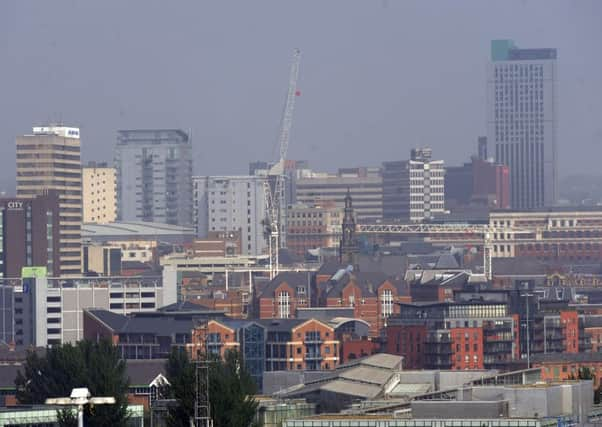Leeds '˜clean air tax' could harm city's building boom, fear experts


The local authority has recently approved plans to introduce a Clean Air Zone (CAZ) for Leeds - which could include access restrictions and penalty charging for gas guzzling vehicles - on the orders of the Government, It could be enforced in the next three years.
However the Builders Merchants Federation (BMF) said today that it fears the proposals as they currently stand will hamper key developments at a time when the city is undergoing a resurgence in building.
Advertisement
Hide AdAdvertisement
Hide AdBMF’s Yorkshire spokesperson Mark Smith, Finance Director of MKM Building Supplies, said: “builders merchants are concerned that the Clean Air Zones policy, as it currently stands, will slow down construction locally.
“Our business relies on HGV lorries and flatbed trucks to deliver our products to building sites. We believe that alternative measures to the access restrictions and penalty charges that are due to be imposed could be just as effective at improving air quality.”
The Federation is calling on the council to consider helping businesses to replace old, polluting vehicles with viable and clean equivalents.
John Newcomb, managing director of the BMF, said: “We question the fairness in allowing different cities to adopt different criteria, such as excluding private cars from the charges.
Advertisement
Hide AdAdvertisement
Hide Ad“We believe that instead of the proposed policy, better traffic management locally should be emphasised to bring about lower emissions’ levels, alongside steps to discourage the parking of diesel cars in Zones.”
Under the plans for Leeds, vehicles that don’t comply with engine standards will be required to pay a daily fee or levy to enter the CAZ.
However motoring campaigners have previously expressed concerns that introducing new levies in a relatively short space of time could still leave huge swathes of drivers out of pocket - and is tantamount to a “congestion charge by the back door”.
Under the plans for Leeds, vehicles that don’t comply with engine standards will be required to pay a daily fee or levy to enter the CAZ.
Advertisement
Hide AdAdvertisement
Hide AdNewer vehicles that meet the latest emissions standards will not have to pay, and under current plans, neither will private cars.
The new regulations could also see taxpayers coughing up more than £1m to pay for a network of cameras in the city.
A spokeswoman for Leeds City Council said: “We are very much aware of the potential impact Clean Air Zones could have on businesses across the city and have raised a number of issues with central government, through their consultation, to highlight where we feel there are gaps in support for SMEs, in their current proposals.
“We are also working closely with central government to identify any potential streams of funding which could help SMEs, including builders, which could be affected by the Clean Air Zones.
Advertisement
Hide AdAdvertisement
Hide Ad“Defra has determined that Leeds must implement a Clean Air Zone however it is important to note that no specific decisions have been made around how this would be implemented in Leeds. We are currently gathering the evidence which should allow us to make further proposals later this year, which would then be followed by a period of consultation during which all interested parties, including builders and builders merchants, will have the opportunity to share their views, before any final decision on location, vehicles affected or charges levied, is made.
“Leeds City Council takes air quality very seriously and has been working on a number of initiatives which would work alongside the Clean Air Zone to help tackle air pollution in the city.”
Leeds is one of five cities ordered by the Government to introduce Clean Air Zones by 2020 to discourage older, higher emission vehicles from operating in city centres whilst encouraging replacement of these vehicles with newer, cleaner ones.
The city is in the ‘Class C’ action category, meaning it must impose new regulations for buses, coaches, taxis, HGVs and light good vehicles as well as taking “additional local action”.
Leeds City Council’s cabinet is expected to make its recommendations on the size of the city’s CAZ, and the fines and enforcement processes attached to it, next month.